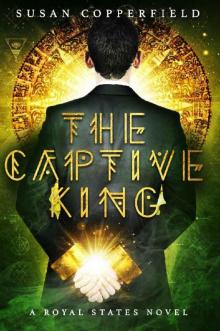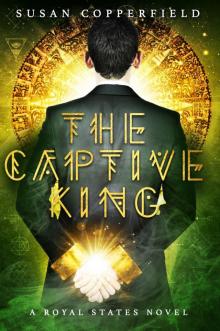- Home
- Susan Copperfield
Storm Called
Storm Called Read online
Storm Called
A Royal States Novel
Susan Copperfield
In the Royal States of America, magic rules all, but life—and love—always finds a way.
Latent horse empath. Dishwasher. Closet chef.
Future king.
When food poisoning sweeps through Dallas, Patrick Laycal doesn't expect a princess to show up at his door asking for his help.
Her one, simple request dumps him in the middle of a Royal mess—one that could cost him far more than just his life.
Copyright © 2019 by Susan Copperfield
Cover Art by Daqri Bernardo (Covers by Combs)
All rights reserved.
No part of this book may be reproduced in any form or by any electronic or mechanical means, including information storage and retrieval systems, without written permission from the author, except for the use of brief quotations in a book review.
Dedication
A special thanks to my editor and proofreaders. This book couldn’t have happened without you.
* * *
Also, thank you to everyone who has stuck with me as I’ve explored the Royal States. I hope you’ve enjoyed your stay.
Contents
Chapter 1
Chapter 2
Chapter 3
Chapter 4
Chapter 5
Chapter 6
Chapter 7
Chapter 8
Chapter 9
Chapter 10
Chapter 11
Chapter 12
Chapter 13
Chapter 14
Chapter 15
Chapter 16
Chapter 17
Chapter 18
Chapter 19
Chapter 20
Chapter 21
Chapter 22
Chapter 23
Chapter 24
Chapter 25
Epilogue
About the Author
Also by Susan Copperfield
By RJ Blain: Magical Romantic Comedies (with a body count)
From Witch & Wolf World
Other Stories by RJ Blain
Chapter One
It was shit luck I was on shift the day the Texan Royals decided they had a hankering for overcooked fries and burgers so sopping with grease I wouldn’t have fed them to a pig. I was fortunate; I washed dishes, so I wouldn’t meet any of them, not in my worn jeans and flannel shirt. They wouldn’t even know I existed, and I liked it that way.
The rest of the staff faced off against the king and queen of Texas, who were rumored to be volatile on a good day.
I didn’t want to learn what it was like to be struck by lightning. I also didn’t want to find out if they really made low-talent freaks with horse affinities, like me, disappear. My talent had been registered early, at age eight, but it had refused to develop into anything worthwhile, which came as no surprise to me.
My parents couldn’t afford a horse. I couldn’t afford the college I attended, let alone a horse. I’d heard the same story all my life: talents needed to be used to develop.
I wasn’t a null, but I’d never grow beyond my current caste. I could live with that. As long as I didn’t mind washing dishes for the rest of my life, I’d always be able to find a job. If push came to shove, I could join the family trade. Everyone needed a janitor. My mother even enjoyed working as a maid.
She believed a clean home was a happy home.
“Pat,” my boss bellowed.
Jerking my head up, I turned away from my work to face him. “Sir?”
“Take twenty for dinner.”
The next time I searched for work, I’d make certain I got a proper thirty-minute break—and I’d remember to pack my lunch every single day on the off-chance royalty might show up wanting bad food for dinner. With the kitchen already in a state of chaos from the unexpected guests, there’d be no leftovers for the staff, leaving me to make the hike down the street to grab something at the convenience store to take the edge off. For a rare change, I appreciated my high odds of food poisoning.
To dodge the royals, I left out the back door, navigated around the garbage littering the alley, and made my escape to the main street. Two minutes later, I reached my destination.
It, too, had a royal infestation, and the Crowned Heir of Texas glared at a bag of chips. Had I been the subject of her scrutiny, I would’ve run for the hills without looking back. Looking back lost races when every second mattered. In the news, the blonde-haired woman scowled often. I couldn’t tell if the lack of selection or indecisiveness bothered her.
It didn’t matter. A smart man avoided trouble, so I headed for the refrigerated shelves to pick a sandwich and roll the dice. Movement in the corner of my eye startled me from my search.
The Texan princess stalked me, her expression one of unwavering determination. “Excuse me?”
“What ya need?” I blurted, and my face grew hot as my accent betrayed me as someone from a lower caste.
She either didn’t notice or care. “What’s good here?”
I frowned, considering the selection of sandwiches. To my dismay, only one lacked eggs or mayonnaise, the top culprits of unexpected digestive distress following the poor choice of acquiring dinner from a convenience store. I grabbed the pulled pork sandwich from the shelf and offered it to her. “If by good you mean edible, your best bet is to take one labelled as made today and hope for the best. This is the one you want.”
I picked the second-best option, and while labelled as from today, it doubled down on the eggs and mayo with some cheese and questionable chunks of chicken. By the end of my shift, I’d regret having eaten anything. I nodded in an effort to be polite and fled while I could. To escape faster, I left the cashier my change to avoid humiliating myself in front of Princess Jessica Dunhaven, the future queen of Texas.
I need a new life and a new stomach to go with it. In a new record of awful, I paid for my kindness within the hour. Queasiness grew into malicious nausea. At the rate I kept swallowing, I’d have a sore throat to go with my churning stomach in no time. The Texan Royals still infested the restaurant, which would help my cause of going home early. I intercepted my boss, temporarily halting his frantic pacing. “Sir?”
My boss arched a brow. “You went to the store down the street, didn’t you?”
“I didn’t want to take long if you needed me,” I confessed.
“Well, I don’t. Head on home and take it as paid time off. The rest’ll be going home as soon as they’re done with their order; those folks will take their sweet time and blow the rest of the night anyway.”
Most days, Dougland McHarrison was a demon, but sometimes he surprised us with his humanity—at least a little. Tomorrow, I expected he’d find a new way to torment me. His creativity when motivated or annoyed impressed me, and the royal family had slaughtered his profits for the day, although if they liked the grease-filled hell he served, he’d be a busy man for weeks to come.
The word of the king and queen could make or break businesses.
Despite my churning stomach and general desire to crawl into a corner and die, I trudged to my evening college class across the city, wasting the extra hours exploring the bookshop down the road from the culinary school. Without a stronger talent, I’d never be able to use what I learned in my classes, but I refused to quit my extended education opportunity; I’d pushed hard from the day I’d entered school to graduating high school to qualify.
On paper, I’d been living perfection, and my efforts had been recognized with an invitation to attend classes at a reduced rate, one I could only afford because I stretched every other penny.
My mother liked insisting a clean home was a happy home, but she’d also taught me that good food was happiness because we
wouldn’t find much happiness elsewhere. I doubt she’d meant for me to become a chef.
Some life lessons she taught me, some I taught her, and we both pretended I succeeded in the way she’d hoped for me. I cheerfully blamed her for the way I had turned out. Her lessons gave me the drive needed to do something more, even though my choices left her wishing for something else for me.
She clung to our caste while I struggled to break free of it.
People like us worked as labor, forming the foundation for the rest of society. In some ways, I had already broken the mold through my careful scraping of pennies to attend classes no one thought I needed.
They, society—and even my parents, however much I loved them—could kiss my ass. I’d already made progress in my life. I spoke in complete, intelligible sentences most of the time. My family hadn’t noticed—or cared—their linguistic butchering further entrenched them in our low caste.
The only way I’d make something of myself was if I refused to pander to society’s expectations.
I could sound intelligent. I worked hard. I did everything I’d been told would lead to success. In a way, they—my parents, society, and every single one of my teachers—had been right. When I quantified my position and compared myself to others in my caste, I enjoyed success.
I also made a mean barbecue chicken, deceptively sweet with crispy skin and enough kick to make the devil cry. As I wasn’t a complete bastard, I served it with sweet yams to soothe the burn and offer refuge from the hell spices I used.
If anyone wanted my pepper blend, they’d have to pry it out of my cold, dead hands. Unfortunately, I doubted anyone would.
No one but me and my parents ate my cooking. Making some effort to meet new people and invite them to my apartment would help with that—if I got my head out of my ass and trusted myself a bit more. I hadn’t ruined a dish in more than a year.
Well, not a dish I’d already mastered through experimentation.
The bookstore bolstered my spirits, and I survived class without anyone suspecting I’d run afoul of a bad sandwich. When I got home, I made a point of making lunch for the rest of the week, and I doubled up on the pepper. If I was going to suffer for my poor culinary choices, it’d taste damned good going down. If I got lucky, it’d be hot enough to make me breathe fire, a useful talent when one wanted to become a chef.
My phone rang an hour before I was supposed to leave for work, and I dreaded talking to anyone, already queasy from a mixture of worry and the remnants of food poisoning. “Hello?”
“Pat, it’s Dougland.” My boss sighed, which I counted as a bad sign. “There’s a problem.”
Whenever a boss called informing me there was a problem, it either meant I was about to work overtime or would lose my job within the next twenty-four hours. “Sir?”
“I’m on short staff today. The royals are swarming for dinner tonight. They’re going to run me out of business at this rate. I’ve been booked every night for the next week. They want the ‘hole in the wall’ experience—and they want to rub elbows with the lower castes.”
Trouble started with an R, and I’d somehow landed straight in the middle of a Royal mess. “What do you need from me, sir?”
For the first time in my life, I hoped to be fired.
“You’re the lowest casted employee I have. They want the full experience. ‘Normal’ food made by ‘normal’ people.
I could envision my boss pressing his phone to his ear with his shoulder while forming quotes with his fingers in the air, his expression one of pure disgust. My mouth dropped open. “Sir?” I blurted.
Why would any member of royalty want to experience life as one of the lower castes? We weren’t exactly rolling in luxuries.
“I don’t know what to tell you. I’m at a loss, too. Tell me, Pat. Do you have any secret weapons up your sleeve?”
I bit back a sigh, unsurprised my boss would want to make use of a skill I’d learned that he, like so many others, disapproved of. “You mean beyond my evening classes at culinary school?”
My boss chuckled. “That’s exactly what I was meaning.”
I could easily imagine my boss with his sleaziest grin plastered on his face, ready to take advantage of me for his profit. “What do you have in mind, sir?”
“I’m thinking you’ll have to showcase your best recipes from your general caste. Got any good dishes up your sleeve?”
I had one trick I could use: barbecue. “I’m going to need ingredients and an idea of how many people will be dining tonight, sir.”
“Get your ass here. I’ll give you the restaurant’s credit card and call my issuer and notify them you’ll be using it. We’ll have a group of twenty tonight.”
The place would be packed, the kitchen would be a living hell, and I’d regret everything by the end of the evening. “I’ll need time to prep,” I warned.
Good barbecue didn’t magically make itself, after all.
“You’ve got until six. Think you can do it?”
My teachers called the first time leading a kitchen a trial by fire, and I understood why. Most started at low-end restaurants just like me, working quiet nights to build confidence and skills.
Barbecue hot enough to melt metal would be my first and last offense, and I wondered if I would be able to work a miracle. Like everyone else in my caste, I didn’t have a choice. Unlike them, I had a Royal mess on my hands, one I couldn’t solve with one safe sandwich given to someone else in a convenience store.
There wasn’t anything I could do to change anything, so I’d do what I’d always do: I’d endure and deal with it.
“Yes, sir. I can do that.”
“Good. Don’t disappoint me.” He hung up.
If I did, I wouldn’t have a job, that much was certain. Getting rid of the expendable would save his reputation if I failed. No one would think twice about it. Nothing would change for me if I impressed even royalty.
The rich and famous were curious—but not curious enough to truly rub elbows with the lowest of the low.
My boss met me at the restaurant’s doors, thrust a credit card into my hand, gave me a signed form authorizing me to use it, and headed back inside without as much as a please or thank you. Months of working for him had numbed me to reality, and I wasn’t even sure why I’d hoped for even a smidgeon of gratitude. At best, he’d grunt his approval. Maybe.
I could read the writing on the wall. No matter what happened, I lost. He’d find some reason to fire me. If the royals liked my cooking, they’d come back again, which would ruin his immediate profit margins. If he got rid of me, he could honestly tell them I’d moved on and apologize. I don’t know what good that would do him, but it might deter them from ruining his profits down the road.
Armed with my boss’s credit card, I hiked to my favorite grocery store, a place with cheap but edible food. The chicken was on sale, but it was always on sale to keep it from spoiling on the shelf. It became my first conquest. It came fattier than most liked, which made it perfect for my needs. The elite—and royalty—wouldn’t dream of eating the rejected meats foisted onto my caste. I’d make them like it, too.
Everyone underestimated me and always would.
I cleaned the store out of chicken before targeting pork and beef ribs to round out the meal. I didn’t cook either often, but I’d make do. The royals wanted a meal made by ‘normal’ people, so I’d give them what they wanted, except it would be the equivalent of our holiday feast rather than our daily dinners.
I doubted they’d appreciate the processed crap that came in a box and only needed water, milk, or butter to prepare. Had I been truly realistic, I would’ve just hit the frozen food aisle and gotten something barely tolerable.
It would’ve been a lot cheaper, but when else would I get another chance to cook for a crowd?
Once I loaded up with enough meat to feed twenty plus extras, I bought several bulk bags of sweet potatoes, enough cornmeal to stuff half the state full of cornbread, and the spices I�
�d need to light their blood on fire.
Then, as I wasn’t unnecessarily cruel, I got enough milk to douse the flames.
I winced at the bill, dealt with the twenty minute delay as the grocery store confirmed I had the authorization to use the credit card, and dragged my two carts of acquisitions to the parking lot, angling for the cab stand. It didn’t take long to flag a cabbie; too many couldn’t afford a car but bought too much to carry, making the grocery stores a prime place for them to find customers. I’d miss the five dollar expense my boss wouldn’t cover, but I’d make up for it elsewhere somehow.
The cabbies wouldn’t run a credit card in the hands of someone from my caste, not even with the authorization form allowing me to do so. Without the lapel pin marking me as a member of a higher caste, they wouldn’t even consider it. We counted as too high of a non-payment risk.
Credit cards would always be beyond me. I’d have to jump two castes to a more moderate tier, something that wasn’t happening in my lifetime. I’d heard stories of those who’d developed strong talents later in life, but they had everything I didn’t.
Without a horse, I had no hope of developing my talent. Without money, I couldn’t get a horse. Without a suitable talent, I’d never land a job that would pay enough for me to afford a horse.
My parents had dealt with their lot in life the only way they knew how: they accepted it, embraced it, and made the most of it.
I cooked, and I meant to enjoy my one and likely last opportunity to work in a kitchen as anything other than a gopher. Ferrying the supplies into the kitchen, I put the milk and meat away, and began work on making the spice rub I needed. My boss hovered in the doorway, and I didn’t need to check for his scowl; my preparations went beyond what men of his caste expected from people like me.

 Cold Flame
Cold Flame Storm Called
Storm Called Bonds
Bonds Null and Void
Null and Void The Captive King_A Royal States Novel
The Captive King_A Royal States Novel Huntress
Huntress A Guiding Light
A Guiding Light The Captive King
The Captive King A Guiding Light_A Royal States Novel
A Guiding Light_A Royal States Novel